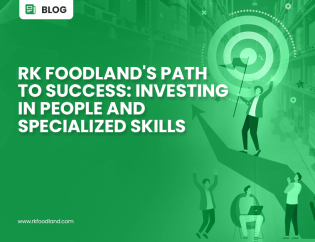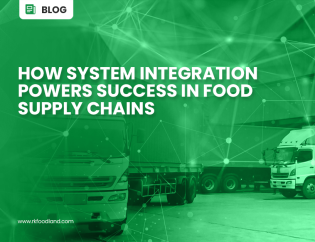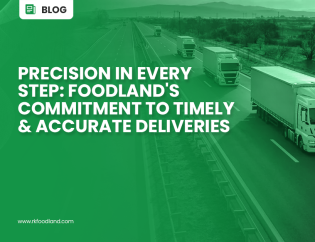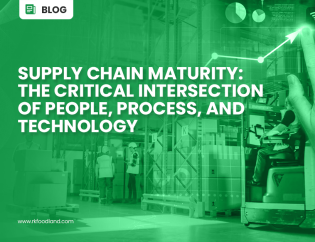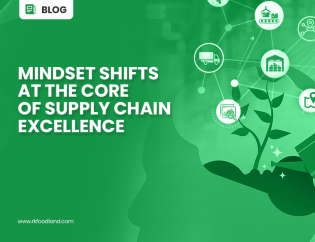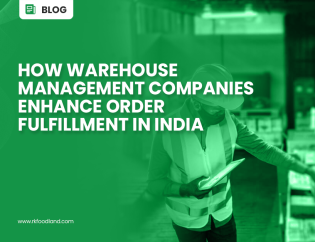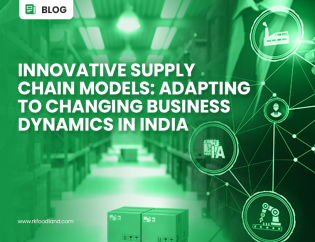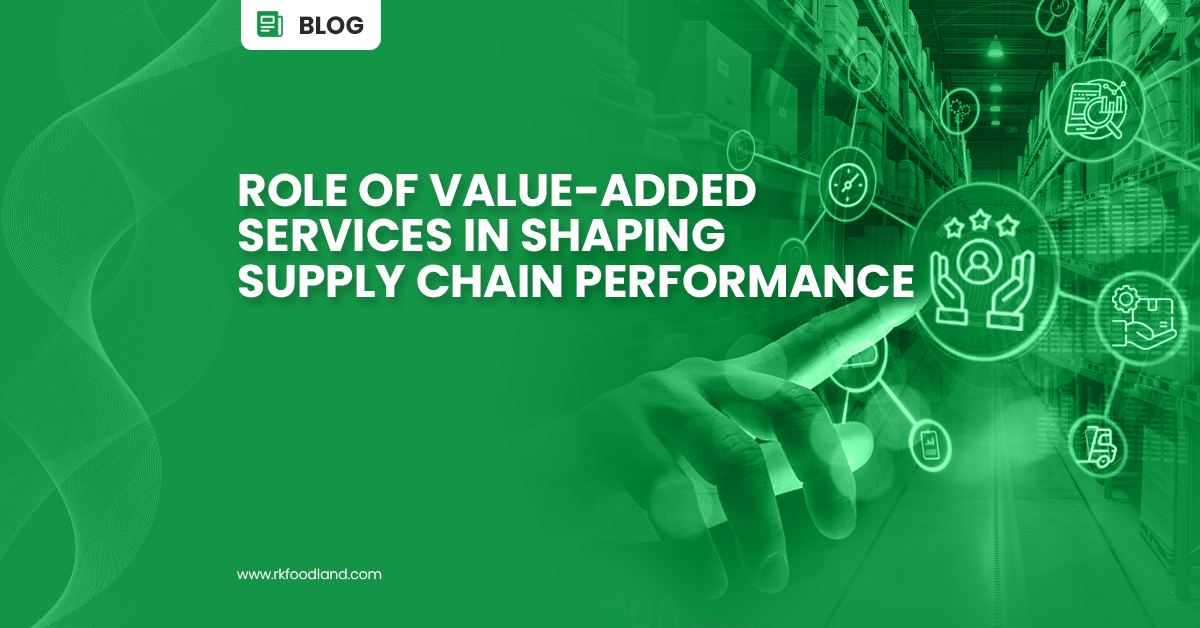
[Avg. Read Time < 5 mins]
In today’s intense competitive market, the food service and food FMCG businesses face a relentless challenge. With customer preferences undergoing rapid shifts, it’s no longer just about delivering a product; it’s about delivering an experience. The success of a business in this sector is often determined by the finest of margins – be it in terms of quality, service, or the overall value it brings to the table. Superior customer service is essential in maintaining existing relationships and forging new ones. With an overwhelming 94% of those surveyed echoing this sentiment, it underscores the need to explore avenues to outpace the competition. This blog delves deep into one such avenue – the significance of value-added services in the food supply chain. By understanding and implementing these services, businesses can not only enhance their supply chain performance but also elevate the value they offer to their customers.
The Competitive Edge of Value-Added Services
Navigating the intricate maze of supply chain operations is no simple feat, especially for Food Services and Food FMCG Businesses. These businesses often grapple with challenges such as perishability, stringent quality standards, fluctuating demand, and the need for timely deliveries. In the face of these operational challenges, value-added services stand out as a promising solution, catering specifically to the distinct requirements of the food sector. As a result, 63% of enterprises utilizing these services view them as a critically important for growth factor. Let’s delve into how these services provide a competitive edge:
- Streamlined Product Handling: With services like bulk-breaking, case-in case-out (kitting), and consolidation, businesses can enhance operational efficiency, minimizing waste and maximizing resource deployment.
- Packaging Excellence: Specialized packaging, repackaging, and labelling services, including stickering, marking, and barcoding, ensure products are presented at their best with added level of security and precise delivery.
- Upholding Quality Standards: Quality control measures, including thorough inspections, ensure that every product aligns with the highest industry benchmarks. This commitment to quality ensures that consumers receive only the best.
- Efficient Returns Management: Comprehensive services for product returns, recalls, and processing ensure that any issues are addressed promptly, maintaining brand trust and integrity.
- Advanced Transportation Solutions: Real-time tracking, temperature-monitoring, freight consolidation, and unit optimization ensure products are delivered in optimal conditions, without wasting space. Thus, being cost-effective, whilst maintaining product quality and integrity.
- Elevated Customer Experience: Timely deliveries, impeccable product quality, and superior post-purchase services enhance customer satisfaction, fostering loyalty and encouraging repeat business.
Various VAS offered by Supply Chain Players and their Impact
Supply chain players are the backbone of the food industry, ensuring that products move seamlessly from supply centres to demand centres. These entities are more than just logistical providers; they’re partners in a business’s success. In today’s dynamic market, it’s crucial for businesses, especially in the Food Services and Food FMCG sectors, to evaluate their supply chain partners, not just based on their core services, but also the value-added services they offer. These VASs can significantly enhance operational efficiency, product integrity, and customer satisfaction.
Let’s explore some of these services and their impact:
Product Handling and Management:
- Bulk-breaking: Allows businesses to purchase in large quantities and sell in smaller ones, enhancing inventory management and reducing costs.
- Case-in Case-out services (Kitting): Streamlines the process of assembling individual items into ready-to-ship kits, boosting efficiency and order fulfilment rates.
- Consolidation: Combines multiple shipments into one, reducing transportation costs and improving delivery timelines.
Packaging and Labelling:
- Packaging and repackaging: Ensures products are presented in consumer-friendly formats, enhancing shelf appeal and reducing waste.
- Labelling, stickering, marking, barcoding: Facilitates easy identification, tracking, and inventory management, ensuring products reach the right destination.
- Promotional kits composition/ co-packing: Allows for targeted marketing campaigns, enhancing brand visibility and consumer engagement.
Quality Control and Inspection:
- Inspection: Ensures products meet the highest quality standards, building trust and reducing the risk of returns.
Returns and Recalls Management:
- Product return and recall services: Facilitates the smooth return or recall of products, safeguarding brand reputation and consumer trust.
- Return processing: Efficiently handles returned products, reducing losses and ensuring customer satisfaction.
Transportation:
- Real-time Tracking: Provides businesses and consumers with real-time information on product location, enhancing transparency and trust.
- Temperature-monitoring: Ensures perishable products remain fresh during transit, reducing wastage and ensuring quality.
- Freight Consolidation: Combines multiple shipments, reducing transportation costs and environmental impact.
- Unit Optimization: Ensures the most efficient use of transportation space, reducing costs and carbon footprint.
Incorporating these VASs can be a game-changer for Food Businesses, offering them a competitive edge and ensuring they stay ahead in the market.
The Power of Partnership: Amplifying the Impact of Value-Added Services
The success of value-added services often flourishes in synergy with a robust supply chain partnership. The right partner doesn’t just execute these services; they amplify their impact, ensuring that every added value translates into tangible business benefits. The more aligned and robust the partnership, the higher the potential to unlock the full potential of these services.
Here’s how to evaluate a partner in the context of delivering value-added services:
- Expertise and Experience: A partner’s depth of knowledge in the industry is crucial. Their expertise dictates how well they can tailor value-added services to your specific needs. A seasoned partner can anticipate market shifts, suggesting proactive measures to stay ahead.
- Total Service, Quality, Value Assurance: It’s not just about offering a range of services but ensuring each one adds significant value. A partner’s commitment to quality and their ability to guarantee value at every stage directly influences the effectiveness of the value-added services they provide.
- Skilled & Trained People: The people executing these services make all the difference. A partner with a well-trained team ensures that every value-added service, from packaging to real-time tracking, is executed flawlessly, maximizing its impact.
- Proven Record for Efficient and Effective Processes: A partner’s historical performance in delivering value-added services is a testament to their capabilities. Those with a track record of efficiency and effectiveness can seamlessly integrate these services into your supply chain, ensuring optimal results.
In essence, the right supply chain partner acts as a force multiplier for value-added services. Their expertise, commitment to quality, skilled team, and proven processes ensure that these services don’t just add value – they transform your supply chain, setting you miles apart from the competition.
In the fiercely competitive landscape of the Food Services and Food FMCG sectors, value-added services stand out as a decisive factor in achieving operational excellence and customer satisfaction. The true potential of these services is unlocked when backed by a robust supply chain partnership, emphasizing expertise, quality assurance, and efficiency. As businesses strive for market dominance, the right supply chain partner, equipped with impactful value-added services, becomes the linchpin of success.
Reach out to our experts to understand the potential benefits of these value-added services for your food business.
Related Content | Foodland’s Resources
The Importance of Value-Added Services in Logistics and SCM!
Driving Growth With Value Added Logistics Services


